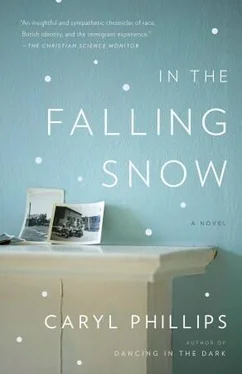‘What happened to your helper?’ He tries to ask the question without it coming across as accusatory.
‘She says she wants some time off, and so I say fine, then go. The council don’t send anybody else yet, but I’m doing just fine for now.’
‘Well I can give you a hand, if you like. Let me just put my stuff upstairs then I’ll start to give things a going over.’
‘Why don’t you just relax yourself and things can fix later on? No big rush. Anyhow, the less I have to do with those people from the council, the better. They think that I don’t know what is going on. First, they send some stupid little man around saying that he is part of the “befriending scheme”. You know, they pay them five pounds an hour to come and talk with you, or take you to the pictures or to some park, like you is too stupid to think for yourself. Then the next thing you know the damn council want to take what little money you have and push you into some place like the Mandela Centre.’
‘You mean supported living?’
‘I don’t care what fancy name they give it, it’s a home and they jail you up in a little flat. The place is full of crazy people wandering the corridors looking for relatives who abandoned them years ago. What the council don’t take from you the other residents thief from you when your back is turned.’
‘But there are people there to look after you and give you medical care. Anyhow, I don’t see what your problem is with the Mandela Centre. Half of your friends are in the place and you go down there, don’t you?’
‘I go down there to pass the time, but I don’t reach the stage yet where I need to be locked up and looked after. I already had enough of that in my life as it is.’
His father looks directly at him and he can see in his eyes that he is fiercely resolute.
‘Listen, Dad, nobody is locked up, right. Everybody has the keys to their own place and you’re free to come and go as you please. You know that. I see a lot of Associations for the Elders in my line of work, and the Mandela is one of the best. There’s no stigma attached.’
His father continues to glare unblinkingly.
‘Look, I know I mentioned it as a possibility when I was last here, but did you at least think about it?’
‘Yes, I think about it.’
‘And?’
‘You know, for a man with such a big education you can sometimes act stupid. I think about it, and two years later you come back and find me still living at home. You really need to ask me what conclusion I did reach?’
He takes the few clothes from his sports bag and lays them out on the bed. He realises that, despite his father’s stubbornness, he will have to sit him down and raise the subject of the condition of the house and once again tentatively explore the possibility of his father moving into the Mandela Centre. As he was doing the washing-up he noticed mouse droppings on the kitchen counter top. He cleaned them up with a paper towel and then rinsed and dried his hands before yanking open the fridge door, where he was greeted by half-eaten plates of food that had long been abandoned, and rancid packets of cheese and butter that had passed their sell-by dates. It isn’t just that things are disorganised and untidy: his father is living in conditions that represent a health hazard. Having emptied the few clothes from his bag, he opens a double wardrobe and tosses the holdall into the bottom of it. On the top shelf of the wardrobe, where one might expect to find a pile of folded sheets or neatly balled up socks and loosely stacked underwear, he is surprised to discover a cardboard box that he lifts clear of the shelf. The box is full of photographs, but they are mainly black and white shots of people that he doesn’t recognise. There are some of Brenda, and a few of his father as a younger man, presumably shortly after his arrival in England. The fashions seem to suggest the sixties, and although in every photograph his father and his friends appear to be cold, they also seem surprisingly content. He wonders if he should take the pictures downstairs for this would, of course, be a legitimate way to encourage his father finally to talk about the past. He holds the box out in front of himself, as though making an offering, and then he decides to replace it in the wardrobe having realised that it might be more politic to raise this subject later, after his father has had time to adjust to his presence. He hoists the box up and on to the shelf and then pushes it to the back and out of sight.
In the evening they sit together in the pub, his father nursing a pint of Guinness and still sporting the pork-pie hat that he always wears on stepping outside his house. His father has made it clear that he knows that there are some photographs in a box somewhere, but he is unsure of their exact location, and he doesn’t understand why his son wants to look at them with him. He decides to say nothing further, but tomorrow, or the next day, he will just hand the box to his father and see if the evidence of the photographs provokes a response.
‘So what about the book that you was telling me that you want to write. A book about music, right?’
‘I’m surprised you remember.’
‘You think I don’t have no memory? Two years ago, when you was last here, you couldn’t shut up talking about it, so I imagine it’s this that you’ve been doing all this time.’
‘Well, I’ve got a job so there’s only so much that I can do. You know how it is.’
‘Me, I don’t have no job, so I don’t know how it is any more.’
His father sips at his Guinness and then returns the glass to the watery circle on his stained beer mat. He watches the old man reach into his pocket for a pack of unfiltered cigarettes and then, with slightly shaking hands, he takes one out, lights up, and then drops the book of matches on to the table.
‘I know you don’t like me to smoke, but what am I supposed to do at my age? It don’t make no sense to give up now, and the landlord turn a blind eye. I better off going straight ahead and finishing off what I started.’
He pushes back his chair from the table and picks up his own empty pint glass. He waits for his father to drain his pint, and then he takes up the second glass.
‘Same again?’ He speaks more to himself than to his father.
When he returns to the table his father is concentrating deeply on his cigarette, the ash of which is hanging precariously from its end. He places the pint in front of him, and then pulls two packets of crisps from his trouser pockets.
‘Cheese and onion or Bovril? Whichever one you want is fine by me.’
‘I don’t want no crisps. At least not yet.’ His father gestures to the two packets with his cigarette, and the ash falls off. ‘I maybe take a crisp later so you can leave me one packet right there on the table.’
This cheerless pub has been his father’s haunt for more years than he can remember, and he suspects that a large percentage of the money that his father has earned in England has flowed across this bar. Although he has never enjoyed coming into this grimy place, for his father it obviously feels like an extension of home. These days the pub appears to have been abandoned by all but a few dedicated drinkers, who seemingly come here in search of company. He is shocked to realise that his father is one of these drinkers. Five years ago, the local university had pensioned off his father, and all the other blue collar janitorial staff, as they decided to outsource their labour needs to private companies, but he had hoped that his father might find part-time work back at the university, or in some other organisation that needed cleaners. Either that, or find a hobby to occupy himself and provide him with a new lease of life. However, during his last visit, he could clearly see that his father had made no effort to re-engage with the world of work in the wake of his redundancy, and it now appeared to him that his father was in danger of embracing a premature inertia that was laced with a hint of reclusive bitterness. He realises that he is both worried and sad to think that this is what his father’s life has become: mornings spent watching television at home, and afternoons and evenings given over to the pub. Because the television in the pub appears to be permanently tuned in to a quiz show of some description, he imagines that the only thing that might cause his father to vary his routine would be cricket. No doubt a Test Match, or a one-day international would convince his father that he should remain at home and spend the day staring at his own television set instead of venturing into this dispiriting place.
Читать дальше









![Unknown - [Carly Phillips] The Bachelor (The Chandler Brothe(Bookos.org) (1)](/books/174132/unknown-carly-phillips-the-bachelor-the-chandle-thumb.webp)


